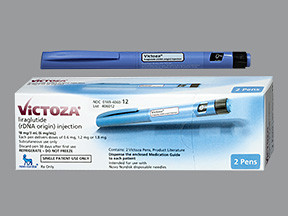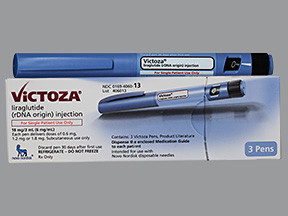LIRAGLUTIDE (DIABETES) - INJECTION
PHONETIC PRONUNCIATION: (LIR-a-GLOO-tide)
COMMON BRAND NAME(S): Victoza
GENERIC NAME(S): liraglutide
Uses
USES: Liraglutide is used either alone or with other medications, and with a proper diet and exercise program, to control high blood sugar. It is used in people with type 2 diabetes. Controlling high blood sugar helps prevent kidney damage, blindness, nerve problems, loss of limbs, and sexual function problems. Liraglutide is also used in people with type 2 diabetes and heart disease to lower the risk of a heart attack, stroke, or death caused by heart disease. Liraglutide is similar to a natural hormone in your body (incretin). It works by causing insulin release in response to high sugar levels (such as after a meal) and decreasing the amount of sugar your liver makes. Liraglutide is not a substitute for insulin if you require insulin treatment.
How to use LIRAGLUTIDE (DIABETES) - INJECTION
HOW TO USE: Read the Medication Guide and the Pen User Manual provided by your pharmacist before you start using liraglutide and each time you get a refill. Learn all preparation and usage instructions. If you have questions, ask your doctor or pharmacist. Inject this medication under the skin in the thigh, abdomen, or upper arm as directed by your doctor, usually once daily. If you are also using insulin, give liraglutide and insulin as separate injections. Do not mix them. You may inject these medications in the same area of the body, but the injection sites should not be next to each other. The dosage is based on your medical condition and response to treatment. Your doctor will start you on a low dose first to decrease your risk of stomach/abdominal side effects, and gradually increase your dose. If more than 3 days have passed since your last liraglutide dose, ask your doctor if you should restart the medication with the low dose to reduce your chance of side effects. Follow your doctor's instructions carefully. Before using, check this product visually for particles or discoloration. If either is present, do not use the liquid. Before injecting each dose, clean the injection site with rubbing alcohol. It is important to change the location of the injection site daily to avoid problem areas under the skin. Use this medication regularly to get the most benefit from it. To help you remember, use it at the same time each day. Carefully follow the medication treatment plan, meal plan, and exercise program your doctor has recommended. Do not share your pen device with another person, even if the needle is changed. You may give other people a serious infection, or get a serious infection from them. Learn how to store and discard medical supplies safely. Tell your doctor if your condition persists or worsens (such as blood sugar remaining high or increasing).
Side Effects
Precautions
Interactions
Overdose
Images
Reviews
Faq for LIRAGLUTIDE (DIABETES) - INJECTION
Liraglutide injection is used to treat type 2 diabetes in adults. It helps control blood sugar levels by stimulating the release of insulin and reducing the production of glucagon.
Liraglutide is typically injected once daily under the skin. The injection should be given at the same time each day and can be administered in the abdomen, thigh, or upper arm.
Common side effects include nausea, vomiting, diarrhea, constipation, headache, abdominal pain, and decreased appetite. These side effects usually improve over time.
Yes, liraglutide injection has been found to promote weight loss in addition to controlling blood sugar levels. This can be particularly beneficial for type 2 diabetes patients who are overweight or obese.
Liraglutide injection begins to lower blood sugar levels within a few hours after the first dose. However, it may take several weeks for the full effects to be seen. It is important to follow your healthcare provider's instructions and regularly monitor your blood sugar levels.
Yes, liraglutide injection can be used alone or in combination with other diabetes medications, such as metformin, insulin, or sulfonylureas. Your healthcare provider will determine the most appropriate treatment plan for you.
Liraglutide should not be used if you have a personal or family history of medullary thyroid carcinoma or multiple endocrine neoplasia syndrome type 2. It should also be avoided if you have a history of severe gastrointestinal disease or pancreatitis. It is important to discuss your medical history with your healthcare provider before starting liraglutide.
When used alone, liraglutide has a low risk of causing hypoglycemia (low blood sugar). However, when combined with other diabetes medications like insulin or sulfonylureas, the risk of hypoglycemia may increase. It is important to monitor your blood sugar levels regularly and adjust your medications as directed by your healthcare provider.
Liraglutide has not been extensively studied in pregnant or breastfeeding women, so it is generally not recommended. It is important to discuss the potential risks and benefits with your healthcare provider in such situations.
Warning
WARNING: This medication has been found to cause a certain type of thyroid tumor (thyroid C-cell tumors) in rats and mice. It is unknown if this medication can cause similar tumors in humans. Talk with your doctor about the benefits and risks of treatment with this medication. This medication should not be used in people with a personal/family history of a certain type of cancer (medullary thyroid carcinoma) or in people with a certain inherited disease (Multiple Endocrine Neoplasia syndrome type 2 or MEN 2). While using this medication, tell your doctor right away if you notice any signs or symptoms of thyroid tumors, including unusual growth or lump in the neck, difficulty swallowing, shortness of breath, persistent hoarseness.
Disclaimer
IMPORTANT: HOW TO USE THIS INFORMATION: This is a summary and does NOT have all possible information about this product. This information does not assure that this product is safe, effective, or appropriate for you. This information is not individual medical advice and does not substitute for the advice of your health care professional. Always ask your health care professional for complete information about this product and your specific health needs.


No Reviews Yet